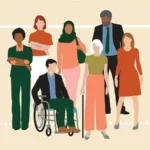This time around we thought we would bring to you an interview - a glimpse into the life of a student with invisible disabilities. In this interview the student lets us into their life and journey to discovering their disabilities, embracing them and living life on the daily and in higher education.
Before we start off, we’d like to make a small disclaimer, namely that the interviewee will remain anonymous. The reason for this is that they fear that having their name broadcasted online with a direct link to a blog post talking about disabilities will lower their chances at employment. As unfortunate as this may be, it is the lived reality of many people with disabilities and contributes to their marginalization. In the interviewees' own words, they mention that they prefer to firstly be hired and let the employer get to know the person they are, and then introduce their disabilities, due to the many stigmatizing biases many still have towards disabilities, including invisible ones.
Furthermore, it is important to note that this interview encompasses the personal experiences of this interviewee. Since all disabilities and people within their environments are unique, their experiences can differ greatly.
What does having invisible disabilities mean to you?
Until very recently I did not know that I have multiple invisible disabilities. I have ADHD, OCD and PTSD. And if I have to describe it, in short, it means that I have to think more than neurotypical people do when going about my daily life. Things are built in a certain way in life to make it easiest for the general population, but I just don’t fall into that. I always have to take extra steps to make it work for me.
What has your journey with your disabilities been?
It’s been weird, since ADHD is something I grew up with. So, as a child I realized I was thinking and working differently mentally from the rest which made me feel very left out. But no one could confirm that since you don’t know how other people think. I knew it was different but I didn’t know why it was so, causing isolation back then. For example, if I was in social settings, a lot of times I wouldn’t know what was going on and why everyone was acting a certain way since I didn’t understand it. It made me feel like I didn't belong with anyone, and that the people I was friends with didn’t understand me at all. That’s why I would keep myself hidden for the most part. I would not show the things that I liked most about my personality at all until my second high school. That’s since I was a kid to 15 years old, and in the meantime I would be my true self only with my brother and myself. Not even my parents saw my authentic self because they were also not comfortable with my personality. I didn’t know I had ADHD at that point.
My OCD is triggered by trauma, so PTSD and OCD essentially came together for me. However, the OCD - being constantly scared, anxious and having intrusive thoughts - was something that I always thought was part of becoming an adult. I thought so because I did not have it as a kid and it began when I was 11, so this is the age I thought I was growing up. I couldn’t recognize that growing up, and having OCD and PTSD, were two separate things that were happening to me at the same time. I learned that I have these - this year! I always thought I had anxiety, however it is relieving to know that it is different than just simply being an adult. It’s almost relaxing to know that there is a reason this happened, and something that caused this.
I also remember that it was harder for me at school because I get a lot of crippling anxiety that causes an inability to do things for school particularly. For example, at university, I had issues with enrollment for the exams and I was once speaking to the administrative assistant at the time. I explained to her that once when signing up I always get nauseous and cry. I remember her staring at me with confusion as I told her that these things were normal and that everyone has that around enrollment. She replied in slight shock that this is not typical for all students and that I should probably seek help with a professional for this. This came as a revelation to me that something was wrong.
Essentially, I grew up with ADHD and had learned how to deal with it. People would just call you quirky while it’s not at all to me. However, OCD was (before the diagnosis) just a load of unanticipated and inexplicable anxiety. And most times you don’t want to be the downer, so you don’t share this part with other people.
Does this make meeting new people more difficult?
Yes and no. After I began studying in an international environment I’ve started to meet more people who are like me and are able to understand my personality better, so I’ve become more comfortable meeting new people. But in the past when I have had to meet new Dutch people I used to get very anxious and didn’t know how to express myself, so I ended up not expressing myself at all. Because when I did express myself people would say “omg you’re so crazy, but you’re fun crazy” and I’ve heard that one too many times. Sometimes people would also say “oh wow you’re already wasted” while I’m just having fun and not drunk at all. So I would get the impression that people felt my personality was too much or the way I express myself was weird, so I would feel the need to tone it down.
Also, part of my conditions includes developing a lot of special interests and obsessions, which is fun - I love it! But it also makes it difficult to share with just anyone because you want to make sure that they understand and won’t think you’re weird because of it.
Do you think that these things have something to do with cultural conditionings and norms? For example, behaving outside the set societal behavioral norm in Dutch culture for a Dutch would be easily identifiable, yet in an international context the lines of the norms are more blurred and therefore the norm shifts?
Yes definitely. And this is why I love the international student culture so much, it’s more about how you are as a person. It has made me feel so comfortable with myself and internationals won’t make me feel weird as quickly.
How has having invisible disabilities impacted your higher education experiences?
Since my brain works differently, the anxiety I have around exams and passing classes is completely crippling. For example, now writing my thesis I literally can’t start because the pressure is all on me. I feel that studying from home has made it all the more difficult to cope because no one can help me. It also means that I have to reach out to people which is very difficult as well because of the anxiety. Because normally when I’m in a group setting I would feel out the pace of the group which provided me with the reassurance that I am doing okay and to keep going. Now I just feel like I can’t do it alone, and not because I need help doing the task itself but rather support through checking in and discussing.
Next to that is the enrollment part. Every single time I had to enroll for a class I would wait until the last moment because of the stress which builds up over weeks of time, therefore when I would do it I would shake from anxiety. I had to do it very quickly so I could trick my brain into not realizing what I was doing to avoid the difficult emotions and sensations that would accompany such an activity typically. Else I wouldn’t be able to do it and no one understands it fully, so you’re alone on this one. The worst part is that you know you have to do it, yet you can’t force yourself to do it, and you don’t know why that is.
So do you wish there were networks and support systems for situations and processes like the ones you’ve described?
Yeah! For example, I have mentioned to some teachers that I struggle with certain things. So I would hope that in moments like these they can provide me with a supervisor for example that can check in on me more regularly instead of just providing whomever is available. And it’s unfortunate that this has never been an option. Another example is that because of my ADHD I struggle with reading thoroughly. I read the question wrong for example, despite my best efforts. However, when I mention this in exam reviews, they simply don’t care and tell me to read better.
A very good example was when I was in high school our teacher would print sometimes on bigger sheets of paper for people who had dyslexia, even though no one in our class had it. And when we would start an exam she would ask who wanted the big paper, and I would always take it. This helped me a great deal, even though it was such a simple thing to do. But this is not the typical case and usually people don’t have these options. This means that you have to really adapt yourself to the environment and circumstances. Instead, the educational system should be prepared to accommodate not only one type of learner because it becomes heavily exclusionary.
Another problem is sitting in the same spot for a long time. For example the stillness and quietness during exams makes me really anxious so I become much more focused on the surroundings than on the exam itself. So having the option of taking exams in different ways, for example in a discussion with a teacher. This would enable many students to showcase their knowledge in a way that they would never be able to do through an exam hall. I usually finish exams in an hour instead of three just because I want to get out and move. But you’re so used to this one type of learning and examination that you have to force yourself to work with it, there’s no way around it since high school. So again, providing options is key, because the oral example might not work for someone and they might have a stronger preference for quiet exam halls.
In the context of professionalism and the way it’s taught in higher education, do you feel like it’s also molded only to a neurotypical audience?
For me the whole concept of seriousness and one-fits-all style of professionally communicating doesn’t work for me. That’s why in a professional work setting I’ve felt the need to express my authentic self through the form of humor, for example. This removes a lot of the anxiety and therefore barriers for me in functioning within these environments. If I can’t do this then I will avoid working and completing tasks. So professionalism should not only be taught through an intercultural lens but also through the perspective of neurodiversity and accommodating different working styles on this ground as well.
Do you have any advice for students with invisible disabilities?
I would personally say, claim your space. You will have to force people to not place you in their box. Tell your teachers! You can’t help that the world isn’t built for you. Make people aware that for you it takes a lot of extra (and different) steps to achieve the same result. Because else they’re never going to realize that it works differently for you.



